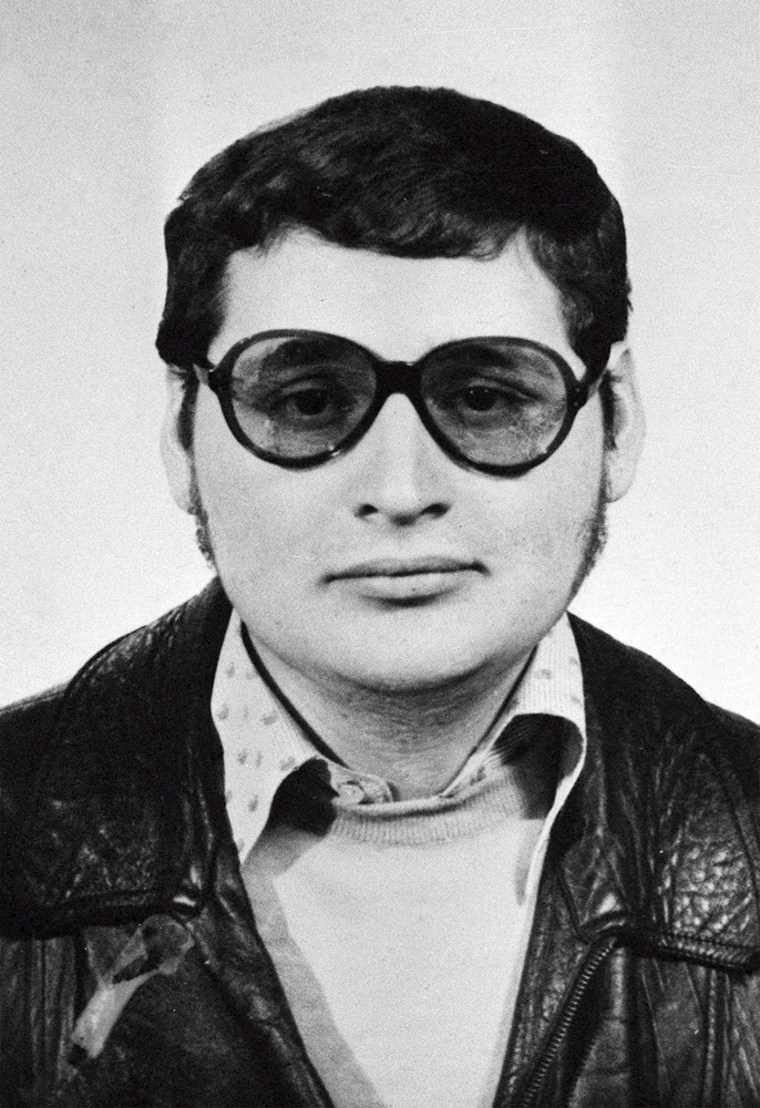A defiant and smiling "Carlos the Jackal," one of the most dreaded terror masterminds of the Cold War, went on trial again on Monday — this time over four deadly attacks in France nearly three decades ago.
The 62-year-old Venezuelan, whose real name is Ilich Ramirez Sanchez, went before a special Paris court on terrorism-linked charges. He is already serving a life sentence handed down for a triple murder in 1975.
Ramirez was one of the most feared masterminds of terror during the Cold War. He is charged with instigating four attacks in 1982 and 1983 that killed 11 people and injured more than 140 others.
He has denied any role in the attacks. A panel of anonymous magistrates will rule after the six-week trial.
Wearing a blue jacket, graying beard and wavy hair brushed back, Ramirez smiled as he entered and then identified himself to the court as "a professional revolutionary" — striking a combative pose from the outset.
With three gendarmes at his side, Ramirez variously raised a fist in defiance, wove in anti-Zionist rhetoric into his diatribes and smiled back to someone in the tightly controlled audience in the chamber.
"He's in a fighting mood as always," Isabelle Coutant-Peyre, Ramirez's lawyer and amorous partner, told reporters outside the courtroom before the trial began. She said there was "no reason" for the trial nearly 30 years after the events, and accused French prosecutors of putting him on trial for "propaganda or some other interests rather than the ones of justice."
But Francis Szpiner, the lawyer for some civil parties to the case, countered that the trial was important to show that terrorists will always be pursued and to mark "the end of the culture of impunity" for them.
Focus on 4 bombings
The trial centers on four bombings: Two against French trains, another at a Paris office of an Arabic-language newspaper and yet another a French cultural center in then-West Berlin.
Those bombings came at least seven years after what French investigators consider was Ramirez's first heyday — eight attacks over two years starting in December 1973.
Ramirez is serving a life sentence for the 1975 murders of two French secret agents and an alleged informer. He was also the chief suspect in the 1975 hostage-taking of OPEC oil ministers that left three people dead.
French prosecutors claim two attacks in 1982 were carried out to pressure the French government to free girlfriend Magdalena Kopp — with whom he later married and had a daughter — and comrade Bruno Breguet.

Five people were killed in the March 1982 bombing of a Toulouse-Paris train — four five days after a deadline for the release of Kopp and Breguet sent in a letter to France's Embassy in the Netherlands. The letter allegedly contained two fingerprints of Ramirez.
Scores were injured and a young girl was killed the next month in a bombing outside the newspaper office — the day Kopp and Breguet went on trial in another case. Both were convicted.
Ramirez allegedly took hijackings, bombings and killings in mercenary style, with links for years to causes like the Popular Front for the Liberation of Palestine and in far-left European terror groups.
Shadowy alliances that thrived during the Cold War kept him beyond the reach of Western secret services. But after the fall of Communism, French operatives nabbed him in 1994 in Khartoum, Sudan, and flew him to Paris.
He was convicted and sentenced to life in prison three years later.
Ramirez staged a nine-day hunger strike last month to protest being placed in solitary confinement after he gave a phone interview to a French radio station. His lawyers claim he was denied access to materials needed to prepare for the trial, including two DVDs containing 100,000 pages.
'A kind of star'"I am really in a combative mood," Ramirez, 62, told Europe 1 radio last month. "I'm not fearful by nature ... My character is suited to this kind of combat."
The Marxist with a Che Guevara beret became the face of 1970s and 80s anti-imperialism, his taste for women and alcohol adding to his revolutionary mystique.
"He was the symbol of international leftist terrorism," said Francois-Bernard Huyghe, a terrorism expert at the Institute of International and Strategic Relations, IRIS, in Paris.
"One day it could be in the service of the Palestinian cause, the next day he could put bombs in French trains. He was a kind of star," he added.
Ramirez's got his nickname after a reporter saw a copy of Frederick Forsyth's "The Day of the Jackal" at his flat and mistakenly assumed it to be his.
His larger-than-life ego manifests itself today in waging hunger strikes and writing letters to U.S. President Barack Obama.
But he and his modus operandi are anachronisms, experts say.
"Carlos the Jackal was the Osama bin Laden of his day," his biographer, John Follain, told Reuters TV. "Terrorism has evolved so much that today he represents a solitary voice in the desert, a pretty old-fashioned voice."
Huyghe was more blunt: "A man like Carlos is really a dinosaur today. I think of him as 'historical remains'."